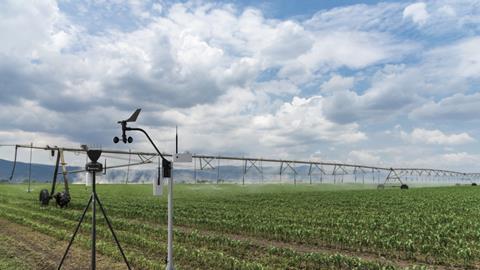The low-cost irradiance sensor from Sencrop hopes to become an essential tool for veg growers
A new irradiation sensor is promising to allow vegetable growers to manage their irrigation, fieldwork and disease protection more precisely, helping to curb costs and boost productivity.
Sencrop’s new Solarcrop irradiance sensor, which has just been launched in the UK, means producers can link up real-time solar irradiation, rainfall, humidity, temperature and wind data, as well as accurate weather forecasting, in one simple app.
The low-cost system operates with exceptional accuracy, large reach and is user-friendly, according to the manufacturer.
Based on crop type and growth stage, the device is said to accurately predict evapotranspiration rates and soil moisture availability, helping farmers to identify when and how much to irrigate without the need for expensive and very localised soil probes.
“Much of the UK is getting drier – and more extreme weather events are becoming the norm,” said Martin Ducroquet, co-founder of Sencrop. “In addition, the environmental issue around irrigation is no longer in question; producers can massively reduce their water consumption by optimising irrigation systems.
”We want Irricrop to change the world of irrigation, by making this new solution accessible to all. This evolution is completely consistent with our original mission, to standardise precision agriculture.”
One sensor can monitor up to 10 fields across a range of 10 miles, explained Thibaut Mathey-Bony, product innovation manager at Sencrop. “Based on two years of research and development and patented technology, Solarcrop measures solar irradiation to a unique accuracy of two per cent.”
When combined with the Raincrop and Windcrop sensors, as well as individual field and crop information, it can accurately predict the soil moisture surplus or deficit over the coming seven days, enabling producers to better plan their irrigation or field work.
“Solarcrop is Sencrop’s third pillar of hyper-local data for farmers, helping them to make the best choices for their crops,” said Mathey-Bony. “The firm now has a network of more than 2,000 connected stations across the country, generating ultra-precise and local information like temperature, humidity, wind speed and rainfall. Now farmers can also measure solar irradiation, it maximises their ability to manage climatic risks, as well as diseases and pests.”
Using the technology gives farmers access a whole range of ag-weather related features: the firm links up with prediction services for diseases like blight and cercospora, so that producers and agronomists can act on highly tailored risk-based advice.
The low-cost plug-and-play service also means everyone can use it, the company adds. The sensors are extremely quick and easy to install, and farmers can choose the appropriate subscription package for them.
“When combined with accurate weather forecasts and real-time monitoring, farmers can optimise the use of inputs, for example only spraying and undertaking fieldwork when the weather conditions are right,” Mathey-Bony added.




